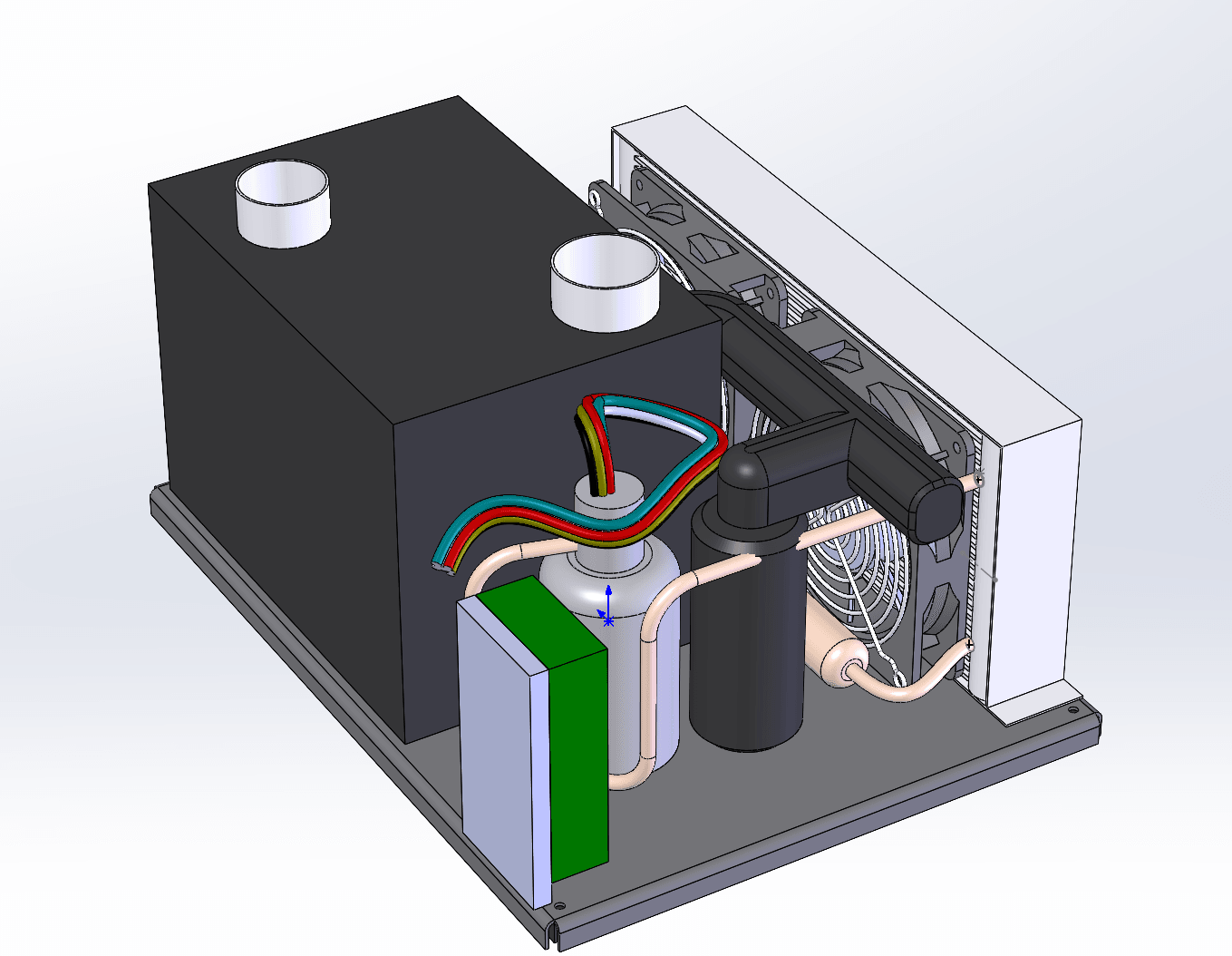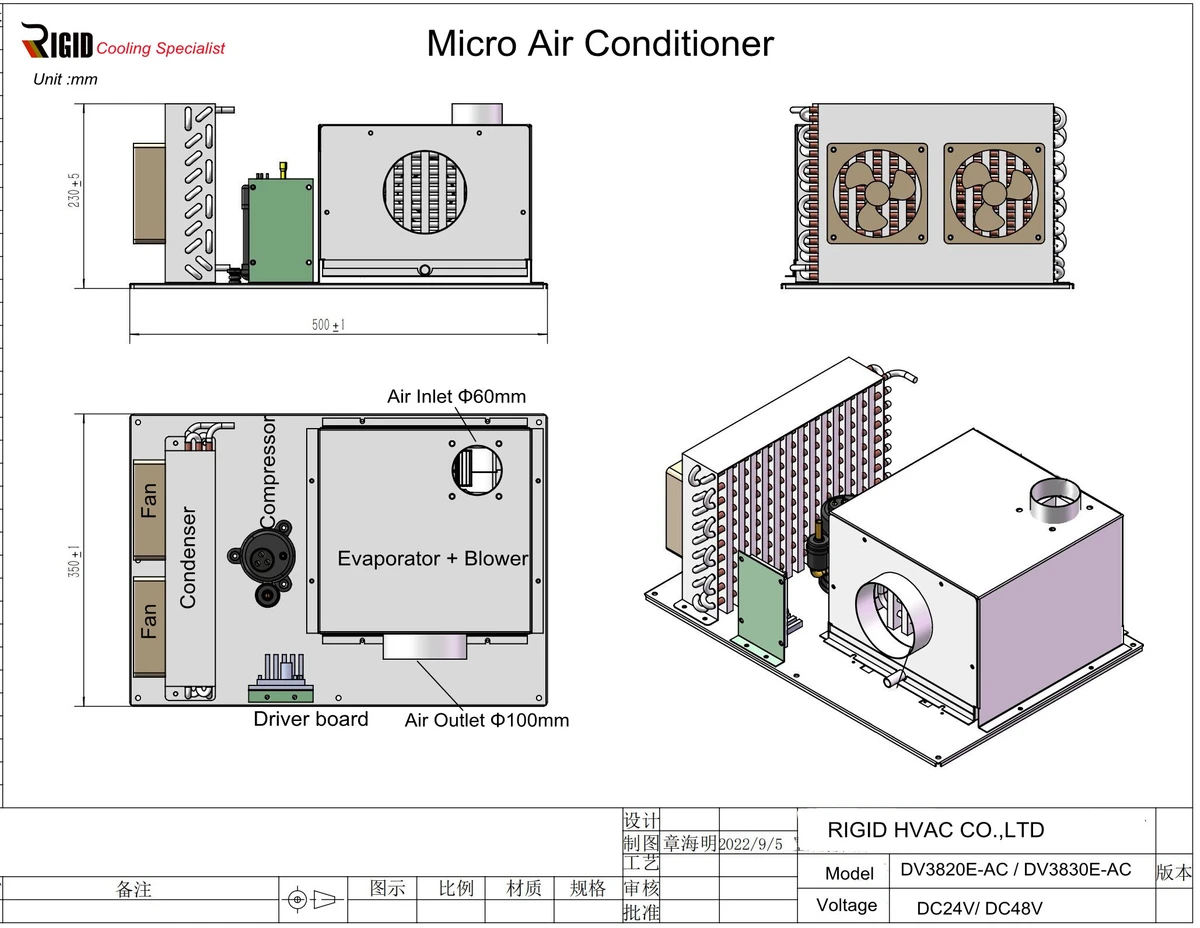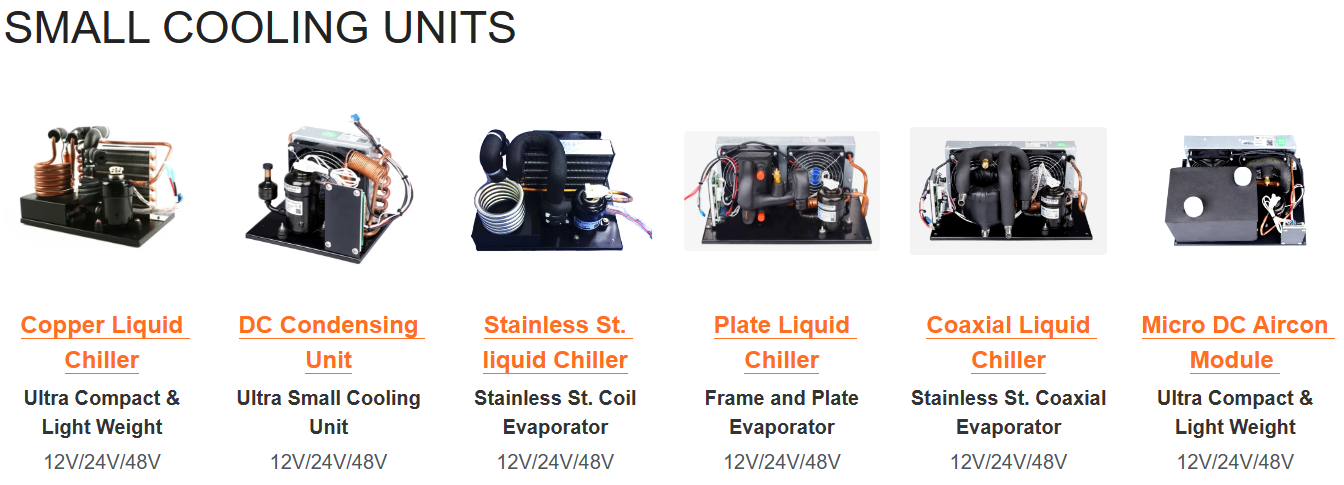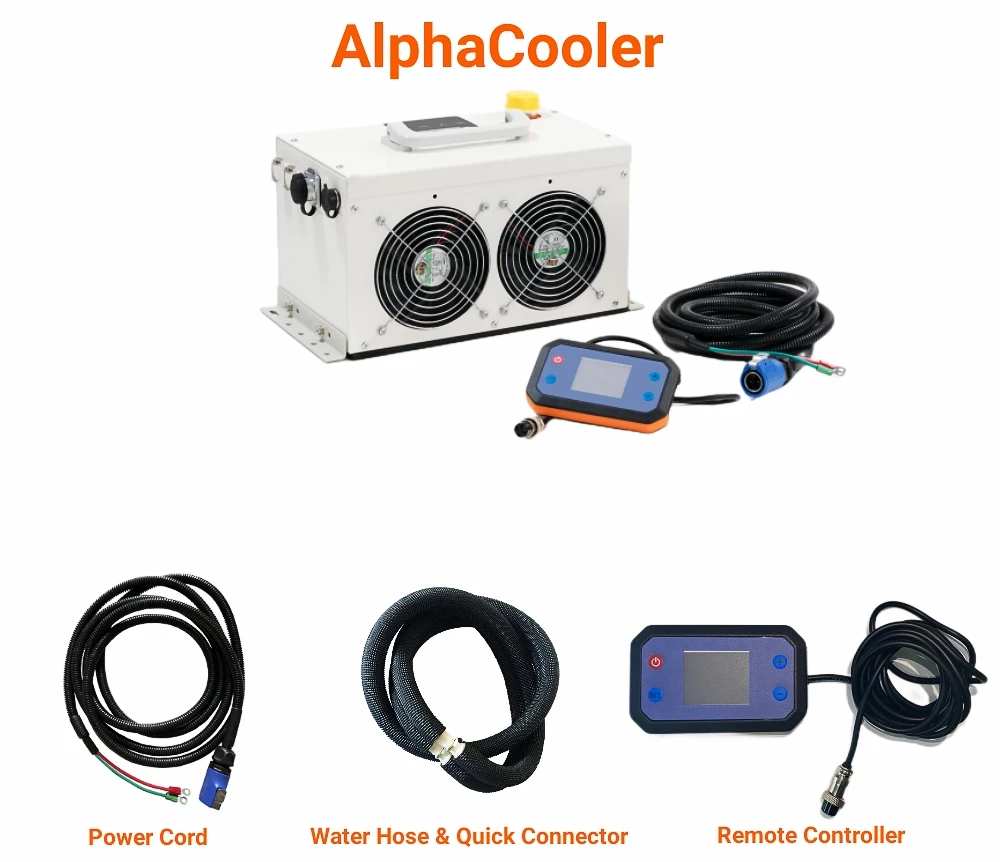Introduction

"RIGID is a miniature refrigerated compressor innovation leader in China. We keep looking for novel solutions in compact and portable cooling systems. We capture new technologies in mobile and compact cooling systems."
When it comes to efficient cooling solutions, water cooled system air conditioning is a game-changer in the industry. This innovative air conditioning system utilizes water as a cooling agent, offering a range of benefits that set it apart from traditional AC units. From centralized cooling to cost efficiency, water cooled systems are revolutionizing the way we think about air conditioning.
Understanding Water Cooled System Air Conditioning
Water cooled system air conditioning operates by using water as a heat transfer medium, allowing for more effective cooling compared to standard air-cooled systems. By harnessing the natural properties of water, these systems can provide superior cooling performance in various settings, making them an ideal choice for businesses and commercial spaces.
Water cooled AC systems offer the advantage of being more energy efficient, as water is a better conductor of heat than air. This means that less energy is required to achieve the same level of cooling, resulting in lower electricity bills for businesses. Additionally, water cooled systems tend to be quieter than air-cooled ones, creating a more comfortable and peaceful environment for employees and customers.
Advantages of Water Cooled AC Systems
The advantages of water cooled AC systems are numerous and significant. Not only do they offer efficient and consistent temperature control, but they also excel in providing cooling for large spaces such as office buildings, shopping malls, and industrial facilities. Additionally, these systems are known for their reliability and longevity, making them a worthwhile investment for any business.
Water cooled AC systems are also known for their energy efficiency, as they use water as a cooling agent, which is more effective at removing heat than air. This means that businesses can save money on their energy bills while still maintaining a comfortable indoor environment. Additionally, water cooled systems require less maintenance compared to air-cooled systems, reducing the overall cost of ownership and making them a cost-effective choice in the long run. With lower operating costs and minimal upkeep, these systems offer a compelling financial advantage for businesses looking to invest in reliable cooling solutions.
Cost Efficiency of Water Cooled Systems
One of the key selling points of water cooled systems is their cost efficiency. These systems are designed to operate with optimal energy consumption, resulting in lower utility bills for businesses. The long-term savings combined with the superior performance make water cooled AC systems an attractive choice for those looking to upgrade their air conditioning infrastructure.
Water cooled systems also offer a quieter operation compared to traditional air-cooled systems. This is a significant advantage for businesses located in noise-sensitive areas or those looking to create a more peaceful work environment. By reducing the amount of noise generated during operation, water cooled systems contribute to a more comfortable and productive workplace.
How Water Cooled Systems Work

Water cooled system air conditioning is a highly efficient method of cooling, using water as the heat transfer medium. The process begins with warm air being drawn into the system and passed over chilled water coils, where the heat is absorbed and removed from the air.
Cooling Process in Water Cooled AC
The cooling process in water cooled AC involves the circulation of chilled water through a network of pipes and coils. As warm air passes over these coils, the heat is absorbed by the chilled water, effectively cooling the air before it is distributed throughout the space. This method allows for consistent and reliable cooling, even in large areas.
Furthermore, water cooled AC systems are known for their energy efficiency and cost-effectiveness. By using water as the primary cooling medium, these systems require less electricity to operate compared to traditional air-cooled units. This results in lower utility bills and reduced environmental impact, making water cooled AC a sustainable choice for cooling large commercial or industrial spaces.
Components of Water Cooled Systems
Water cooled systems consist of several key components, including a chiller unit, cooling tower, pumps, and distribution system. The chiller unit cools the water, which is then circulated through the system to absorb heat from the air. The cooling tower releases this heat into the atmosphere, allowing for continuous operation.
After the water is cooled, it is then pumped through a distribution system to various parts of the building where it is needed for air conditioning. The pumps play a crucial role in ensuring that the water flows smoothly and efficiently through the entire system, maintaining a consistent and comfortable indoor temperature. This distribution system allows for precise control over the cooling process, ensuring that each area of the building receives the necessary amount of cooled water.
RIGID's Mini Compressor in Water Cooled AC
RIGID's mini compressor plays a crucial role in water cooled AC systems by providing efficient and reliable compression of refrigerant gases to facilitate the cooling process. With RIGID's innovative technology, these compressors are designed to be compact yet powerful, making them ideal for use in small-scale refrigeration and air conditioning applications.
The compact size of RIGID's mini compressor makes it a perfect fit for water cooled AC systems in small spaces, allowing for efficient cooling without taking up valuable real estate. Additionally, the powerful compression capabilities ensure that the refrigerant gases are effectively transformed to facilitate the cooling process, resulting in a comfortable environment. With RIGID's innovative technology at the helm, these compressors not only deliver reliable performance but also contribute to energy efficiency, making them a sustainable choice for air conditioning applications.
Benefits of Central Air Conditioning System

Efficient Cooling in Large Spaces
Central air conditioning systems are designed to efficiently cool large spaces, making them ideal for commercial and industrial settings. These systems can provide consistent and powerful cooling throughout a building, ensuring a comfortable environment for employees and customers alike.
Consistent Temperature Control
One of the key benefits of central air conditioning is its ability to maintain consistent temperature control throughout an entire space. This ensures that every area within the building is kept at the desired temperature, creating a comfortable and productive work environment.
RIGID's Small Chillers for Central Air AC Units
RIGID offers small chillers specifically designed for central air AC units, providing efficient and reliable cooling solutions for businesses. These small chillers are compact yet powerful, making them an ideal choice for businesses looking to upgrade their central air conditioning systems.
Sustainability of Water Cooled Systems

Energy Efficiency of Water Cooled AC
Water cooled systems are known for their exceptional energy efficiency, using water as a cooling agent instead of air. This results in lower energy consumption and reduced electricity bills, making them a sustainable choice for businesses looking to minimize their environmental impact while saving on operational costs.
Environmental Impact
In comparison to traditional air conditioning systems, water cooled AC units have a significantly lower environmental impact. By utilizing water as a cooling medium, these systems reduce the emission of harmful greenhouse gases and ozone-depleting substances, contributing to a healthier planet and cleaner air for all.
RIGID's Direct Cooling Systems for Sustainability
RIGID's direct cooling systems are at the forefront of sustainability in the HVAC industry. With a focus on energy efficiency and environmental responsibility, RIGID's innovative solutions offer businesses the opportunity to reduce their carbon footprint while enjoying reliable and effective cooling for their commercial spaces.
Comparison with Traditional AC

When comparing water cooled system air conditioning to traditional air conditioning, the former offers significant advantages in terms of energy efficiency, environmental impact, and overall cost-effectiveness. Water cooled systems are known for their ability to efficiently cool large spaces while consuming less energy, making them a more sustainable option for businesses looking to reduce their carbon footprint.
Advantages over Traditional Air Conditioning
Water cooled systems have the upper hand when it comes to cooling efficiency and sustainability. Unlike traditional AC units that rely on refrigerants and air ducts, water cooled systems use water as a cooling medium, resulting in more efficient temperature control and reduced energy consumption. Additionally, water cooled AC units have a longer lifespan and require less maintenance, making them a more cost-effective choice in the long run.
Cost Comparison
In terms of cost comparison, water cooled systems may have a higher upfront investment but offer lower operational costs over time. The energy efficiency of water cooled AC units translates to reduced utility bills, saving businesses money in the long term. With proper maintenance and regular servicing, water cooled systems can also have a longer lifespan compared to traditional air conditioning units.
RIGID's Micro DC Aircon for Modern Cooling Solutions
RIGID's Micro DC Aircon is at the forefront of modern cooling solutions for businesses seeking efficient and sustainable air conditioning options. With its compact design and superior performance, RIGID's Micro DC Aircon is an ideal choice for commercial spaces looking to make the switch to more environmentally friendly cooling solutions.
Custom-Made Solutions for Businesses

In the world of B2B, tailored refrigeration solutions are essential for meeting specific business requirements. RIGID offers custom-made refrigeration solutions that are designed to fit the unique needs of businesses. Whether it's a central air conditioning system or a specialized cooling unit for a specific industry, RIGID's expertise in mini compressors and small chillers ensures that businesses get the perfect solution for their cooling needs.
Tailored Refrigeration Solutions for B2B
When it comes to B2B refrigeration, one size does not fit all. That's why RIGID specializes in providing tailored refrigeration solutions that cater to the specific needs of businesses. From central air conditioning systems to custom-built cooling units for industrial applications, RIGID's mini compressors and small chillers are designed to deliver efficient and reliable cooling solutions that meet the unique requirements of businesses.
RIGID's team of experts works closely with businesses to understand their specific refrigeration needs and challenges. By conducting thorough assessments and evaluations, RIGID ensures that the tailored solutions provided are not only efficient but also cost-effective for businesses. This personalized approach sets RIGID apart from other refrigeration providers, as the company goes above and beyond to deliver solutions that truly meet the unique requirements of each B2B client.
Meeting Specific Business Requirements
Businesses often have specific requirements when it comes to air conditioning and refrigeration. Whether it's maintaining precise temperature control in a large commercial space or implementing a specialized cooling system for industrial processes, RIGID understands the importance of meeting these specific business needs. With a focus on innovation and quality, RIGID works closely with B2B clients to develop custom-made refrigeration solutions that address their unique challenges and deliver exceptional performance.
RIGID's team of experienced engineers and technicians are dedicated to finding innovative solutions for each client's unique needs. By staying at the forefront of technological advancements, RIGID is able to offer cutting-edge refrigeration systems that are tailored to meet specific business requirements. This commitment to excellence ensures that clients receive top-of-the-line products that not only meet their current needs but also have the flexibility to adapt to future changes in their operations.
RIGID's Custom-Made Refrigeration Solutions
RIGID is committed to providing custom-made refrigeration solutions that go beyond traditional off-the-shelf options. With expertise in mini compressors, small chillers, direct cooling systems, and micro DC aircon units, RIGID offers a wide range of innovative cooling solutions for B2B clients. By working directly with customers to understand their requirements and budget constraints, RIGID ensures that businesses get cutting-edge refrigeration solutions that enhance their competitiveness in the market.
RIGID's commitment to providing custom-made refrigeration solutions extends to offering personalized design and engineering services to meet the specific needs of each client. Whether it's creating a compact cooling system for a mobile medical unit or developing an energy-efficient chiller for a data center, RIGID's team of experts is dedicated to delivering tailored solutions that optimize performance and reliability. By leveraging advanced technology and industry-leading knowledge, RIGID ensures that every custom refrigeration solution meets the highest standards of quality and innovation.
Conclusion

Investing in Water Cooled AC Systems is a smart choice for businesses looking for efficient and cost-effective cooling solutions. With RIGID's Innovative Cooling Solutions, including Mini Compressor & Small Chillers & Direct Cooling & Micro DC Aircon, businesses can enjoy superior design and uncompromising quality in their air conditioning system. Making the Switch to Water Cooled Systems can provide long-term benefits for businesses, ensuring sustainability and energy efficiency.
Investing in Water Cooled AC Systems
Investing in a water-cooled system air conditioning is a strategic move for businesses looking to save on energy costs and reduce their environmental impact. With RIGID's innovative cooling solutions, businesses can enjoy efficient cooling without breaking the bank, making it a wise investment for long-term sustainability.
RIGID's Innovative Cooling Solutions
RIGID is a pioneer in the micro cooling industry, offering superior design and uncompromising quality in their Mini Compressor & Small Chillers & Direct Cooling & Micro DC Aircon systems. Their focus on client budgets and custom-made refrigeration solutions makes them the go-to choice for businesses seeking innovative cooling solutions.
Making the Switch to Water Cooled Systems
Making the switch to water cooled systems can provide businesses with consistent temperature control and efficient cooling, especially with RIGID's central air conditioning unit options. By embracing modern cooling solutions like RIGID's offerings, businesses can ensure they are at the forefront of sustainable and cost-efficient air conditioning technology.